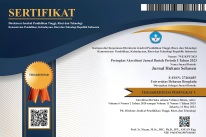Implications Of The Use Of E-Stalls On The Binding Force In Proof Of Electronic Agreements
Abstract
In making an agreement, the public generally has the view that the use of a stamp on the agreement letter is necessary for the agreement to be considered valid. Rapid developments in information technology have encouraged the use of digital transaction tools, including in the process of making agreements involving electronic documents. Along with technological advances, the legal sector has begun to integrate digitalization, one of which is through the use of e-Stamps as a replacement for physical stamps. This e-Stamp is designed to increase the ease and efficiency in preparing electronic agreements, especially in the current digital era. In 2020, the Indonesian Government passed Law no. 10 concerning Stamp Duty which states that this electronic stamp is a new type of stamp. The legal force possessed by an electronic stamp or e-stamp applied to electronic documents can function as legal evidence. This study aims to determine the form of binding power and proof of agreement from an electronic stamp, which is concluded using normative legal research methods. The results of the study show that the use of electronic stamps (e-stamps) has been strictly regulated in applicable regulations and can function as valid evidence in the context of electronic agreements. This study aims to analyze the use and validity of Electronic Stamp Duty according to the perspective of the Civil Code reviewed from Law Number 10 of 2020. This study uses a normative legal method with a type of legislative approach and a legal concept analysis approach. The results of the study achieved that the Electronic Stamp or E-Stamp is a new type, so the legal force of this Electronic Stamp is the same as the Stamp Temple, and has been in effect since the enactment of Law Number 10 of 2020 concerning Stamp Duty. The validity of Stamp Duty based on Law Number 10 of 2020 concerning Stamp Duty which uses Electronic Stamp can be used as evidence in Court, because the signature alone does not meet the requirements for the agreement made as evidence in Court based on Article 1320 of the Civil Code, but the Electronic Stamp is not a determinant of the validity or otherwise of the document submitted to the Court.
Downloads
Copyright (c) 2025 Keisha Zahra Wibowo, Gio Hartanto

This work is licensed under a Creative Commons Attribution-ShareAlike 4.0 International License.






